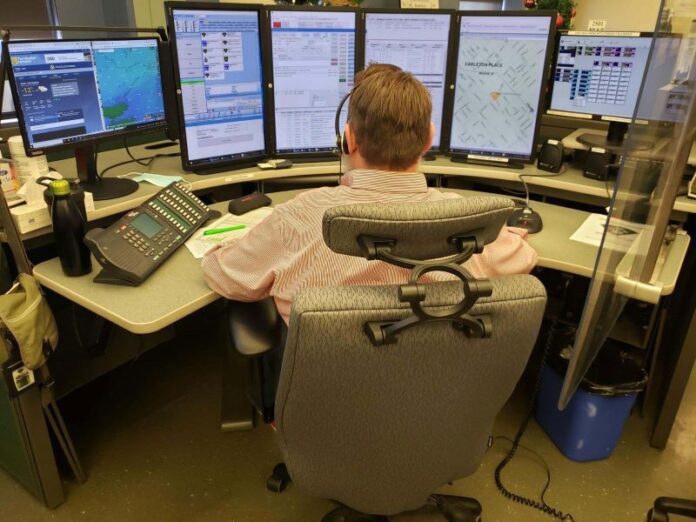Chris Allan describes a day in the life of Provincial Communication Centre (PCC) in Smiths Falls. Chris explains the dispatchers roll in the day to day running of any police organization is vital. If there were no call takers, who would the public call? If there were no dispatchers, who would the officers depend on to help them help the public? Call takers hear the cries for help, the frustration, anger, panic, desperation, sadness and fear. They speak to people, sometimes at the worst possible time in their lives, while trying to help them, and getting the officers the information and support they need. It is not an easy job.
Dispatchers, or call takers, that work for the PCC are all front line workers. OPP call takers are the first contact point between the Public and the OPP. They work shift work (12 hours), evenings, weekends, and holidays.
Chris has been doing this complex career for 19 years starting in Belleville then onto Perth before ending up in Smiths Falls. Chris is married and has two adult children, one continuing education as the other is out in the working world. While away from the hustle and bustle of the PCC, Chris loves the outdoors all year round. Chris can be found hiking, cycling, skiing, skating or relaxing at the cottage. Chris loves to be active that’s for sure.
Once it’s time to put the headset back on, Chris has to manage calls and 6 screens in front of him. To say he is a highly skilled multi-tasker is an understatement. Chris wants us to know more about the wonderful staff at PCC and the multitude of tasks they do.
How they start the day depends on where they are sitting. There is a division of labour in all PCC’s, separated into call taking and dispatching. Once they are set up at their desks for their shift, they are ready to take calls for service. As a dispatcher, they manage 6 monitors and 3 computers, assisting the public with calls for service and getting officers out to the locations. When they relieve their colleagues they conduct a “hand off”, or mini debrief of what is currently on the go, anything that is outstanding, any concerns or major events that may be ongoing.
As an East Region call taker they process calls for service and treat all callers equally and at face value. They use a headset and answer calls with a beep in their ear, with a slight difference between 911 calls and non-emergency lines. 911 is strictly to be used for EMERGENCY calls and others are directed to non-emergency lines.
In either role, most especially on the dispatch side of the room, they are tethered to the desk by their headset and they do not have the ability to get up and walk away. There is some leeway on the call taking side, but dispatchers cannot get up and leave their desk for any reason without being relieved. Over a 12 hour shift this requires a great deal of co-ordination. All calls in and out of the PCC are recorded and all calls entered for service, including calls from dispatchers to officers that may be in detachment.
Between January 1 and December 31, 2021, OPP call takers handled 96,126 – 911 calls THAT DID NOT go to the road (Officers) saving 174,661 hours. These are just pocket dials. Call taking is a very one on one conversation with the caller and the call-taker, however there are often times to conference in EMS or other services or police jurisdictions. As dispatchers, our main concern is for the safety of the officers we are dispatching for, the efficient and expedited sharing of vital and accurate information, and the general safety of the public via our actions.
On any call they may be required to do a myriad of different things (multitasking) and be responsible to listen to multiple talk groups (radio channels), TAC’s (tactical channels), the phone, and in person conversations (with Sergeant/supervisor). One of the first duties, whether it is a day or night shift, is to ensure that all officers are logged onto the system accurately. Although officers now have the ability to log themselves on via their MWS (Mobile Work Station, or onboard computer), dispatchers must confirm that they have logged on to the correct vehicle, the correct call sign, the correct badge number, skill sets (like SOCO Scene Of the Crime Officer), off duty time, and work cell number.
As equipment, like cruisers, are shared, it is also vital that the dispatcher confirm officers are off duty and their cruisers are available for the new officers starting their shifts. As dispatchers, we are the conduit between officers on the road and other agencies or services. They are consistently tasked to make contact with MTO, tow companies, funeral services, MOE (Environment), Hydro, Fire, Roads Dept, etc.
Status checks on the officers on the road is required, especially in priority or potentially dangerous situations. Traffic stops are one of the most dangerous situations an officer could be in, given the person driving the vehicle is unknown. The console management is vital. Updating, documenting, and timely clearing events keeps officer timers and status checks up to date. Dispatchers are ultimately accountable for officers.
As with the start of my day, another debrief is required when ending my shift between myself and my relief. Ready to wrap up another day, to go home, get recharged, and do it all over again.




